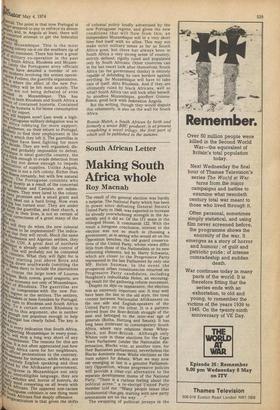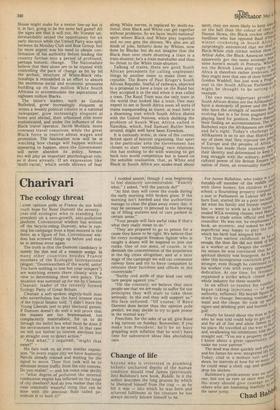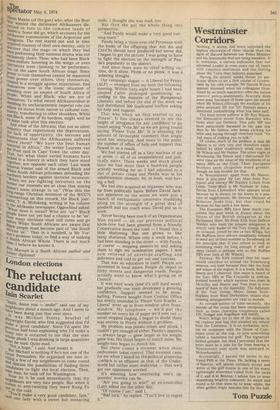South African Letter
Making South Africa whole
Roy Macnab
The result of the general election was hardly a surprise. The National Party which has been in power since defeating General Smuts's United Party in 1948, was expected to increase its already overwhelming strength in the Assembly and it did so. Of the 171 seats in the enlarged House, it commands 122. With the result a foregone conclusion, interest in the election was not so much in choosing a government, as in seeing who would sit on the Opposition benches, the old guard conservatives of the United Party, whose views differ little from those of the Nationalists or its new reforming elements, led by Harry Schwartz, which are closer to the Progressive Party represented in the last Parliament by only one MP, Helen Suzman. In the event the prosperous urban constituencies returned six Progressive Party candidates, including Houghton's redoubtable Helen, an encouraging result for the gathering reform movement.
Despite its deja-vu appearance, the election was an extremely important one. It may well have been the last in the old style, the tired contest between Nationalist Afrikaaners on the one side and English-speakers of the United Party on the other. It is a pattern derived from the Boer-British struggle of the past and belonged to the inter-war age of generals (Botha, Hertzog and Smuts); It has long been irrelevant to contemporary South Africa, where race relations mean WhiteBlack, not Boer-British. Although only Whites vote in these elections for the Cape Town Parliament (under the Nationalist dispensation, Blacks vote, at another time, for their Bantustan parliaments), nevertheless the Blacks dominate these White elections as the main subject for debate. What we may now see emerging. at last is a genuine Parliamentary Opposition, whose progressive policies will provide a clear-cut alternative to the separate development theme of the National Party. "There is a curious feeling about the political scene," a re-electgd United Party member told me. "Many people sense that fundamental changes, starting with new party orientations are on the way . . ."
The swapping of political jerseys in the
House might make for a neater line-up but is it, in fact, going to be the same ball game? All the signs are that it will not. Mr Vorster understandably seized the opportunity for an early election while the United Party was split between its Monday Club and Bow Group, but far more urgent was his need to obtain confirmation of his authority before leading the country further into a period of profound, perhaps historic, change. The Nationalists believe that they alone are to be trusted with controlling the pace of change as bit by bit the archaic, structure of White-Black relationships is remodelled in an effort to absorb the enormous social and economic pressures building up on four million White South Africans to accommodate the aspirations of eighteen million Blacks.
The latter's leaders, such as Gatsha Buthelezi, grow increasingly eloquent at writes a weekly political column in a national newspaper, grow increasingly eloquent at home and abroad, their urbanised elite more sophisticated, and under the influence of the Black travel operator, Jacob Mohlala, more overseas travel conscious, while the great Black force is restive about wages and promotion. The fascination now will be in watching how change will happen without appearing to happen, since the Government will never abandon its policy. Semantics will play an important psychological role, as it does already. If an expression like 'multi-racial,' which sends shivers of fear along White nerves, is replaced by multi-national, then Black and White can get together without problems. So we have 'multi-national' sport where Black and White play together and no one gets the shivers. We also see all kinds of jobs, hitherto done by Whites, now done by Blacks: but do not imagine that the Black man over there shunting a train is a train-shunter; he's a train-marshaller and thus no threat to the White train-shunter.
Talking of trains, there are good South African precedents for calling unpleasant things by another name to make them acceptable. The Boers of Paul Kruger's South African Republic, fearful of railways, objected to a proposal to have a train on the Rand but they accepted it in the end when it was called a tram. The Rand Tram was the only tram in the world that looked like a train. One may expect to see in South Africa soon all sorts of trains masquerading as trams; at least here is a disarming trait which South Africa shares with the United Nations, which disliking the problem of South West Africa called it Namibia, which, had Samuel Butler been around, might well have been Erewhon.
It is curiously ironic, in view of the current British sport of boycott organising, that sport is the particular area the Government has chosen to start 'normalising' race relations; this has nothing to do with wanting to get back into world competition but is based on the sensible realisation, that, as White and Black in South Africa are snake-mad about
,The
zpectator May 4, sport, they are more likely to keep their on the ball than the colour of their s,• Hassan Howa, the Black cricket official hardliner who has opposed Basil d'Olivi winter cricketing in South Afr4 O surprisingly announced that we w' Black-White club cricket within three Y Arthur Ashe, the Black American tennis apparently got the same message frorner same horse's mouth in Pretoria. Whethso not the British Lions play rugby in ho Africa is therefore rather irrelevant, they might note that one of their formerj Gordon Waddell, has just won a Progr" seat in the South African Parliament', , might be thought to be setting a example. The two most important groLIPS in South African drama are the Afrikaaners: have a monopoly of power and the Ainti who have the strength of numbers. 130tot evolving fast in a far from stagnant 5itw,,d5 playing hard for position. Peace depeofo, their finding an accommodation. The.,lo Buthelezi says the Afrikaaners are inup,,r and he's right. Today's challenge Afrikaaners is so to act that History vi'ci Say of them that they rejected the Prin of Europe and the peoples of Africa re history has made them intensely al their identity and determined to keep lAi/ long struggle with the military, Pnlit'c-ad cultural power of the British Empire 01„ nation of them, an eventuality fearec Hiram Maxim (of the gun) who, after the Boer War wanted the decimated Afrikaaners disPersed in toto to the common lands of America. Some did go, Which accounts for the Afrikaaner communities of the Argentine and Patagonia. The rest stayed put and in time ac.quired mastery of their own destiny, only to Cover that the stage on which they had ”e'en performing their national drama was not exclusively theirs. Those who had been Black scene-shifters hovering in the wings or even sPectators were claiming to be performers, too, on the same South African stage. Since F0Wer to rule themselves cannot be separated r°rh power over others, they themselves, c.reated in a struggle against imperialism, find themselves now in the, ironic situation of Presiding over an empire of South Africa of Pc°Ple, White and Black, who are not of themselves. To what extent Afrikaanerdom in shedding its uncharacteristic imperial role can adjust its status from nation to cultural cornillunitY, transferring to other shoulders, White and Black, some of its burdens, might well be Its main task after this election. And what of the Africans, that not so silent Majority that experiences the deprivations, t_he lack of opportunity, the sorrows and trrustrations that the Afrikaaners suffered oefore them? "We have the best human Material in Africa," the writer Laurens van ?ler Post said in Cape Town the other day. 1I 1'e, but what these varied humans have ',acited is a history in which they have stood 'Nether, not opposite each other. Last week eneral Venter said of the armed Black and white South African policemen defending the P‘orthern borders against terrorist incursion: ,When we are fighting terrorists on the !order our interests are so close that mixing pesn't seem strange to us." (Was this the ;?rig-range Christian intention of the WCC?) "Mrimenting on this remark, the Black jourParist, T. A. Mofokeng, writing in his column I.P„..the Afrikaans newspaper, Oggenblad asked: what does it mean? Who are 'us'? Black li"jecIrde have not yet had a chance to be 'us'.
many elections must still come and go
Ore White South Africans are aware that .‘qcf , it People must become part of 'the South rican us'," That in. a nutshell, is Mr Vortees
Problem today, to find a way of making OUfli African Whole. There is not much utile. I believe he knows it.
1,10Y Macnab is a South African author and ionner diplomat.




































 Previous page
Previous page